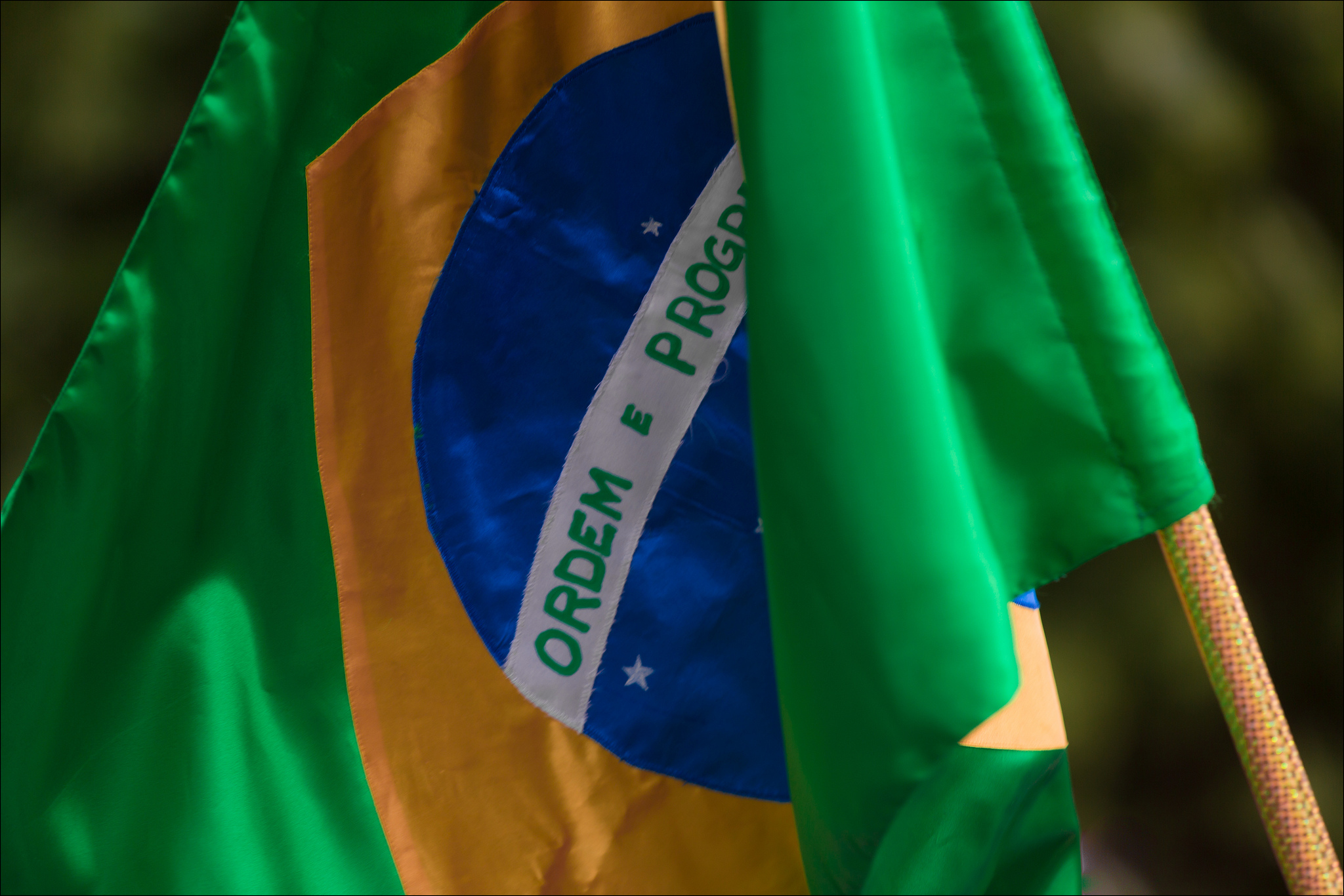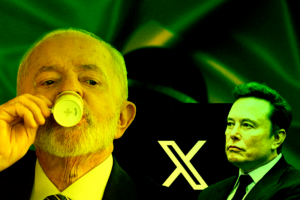Hidden History: The U.S. ‘War on Corruption’ in Brazil
The story of how an overlooked Bush-era foreign policy edict led to Brazil's coup of 2016 and its consolidation in the conviction of former President Lula. Adrien Sifre / CC BY-NC-ND 2.0
Adrien Sifre / CC BY-NC-ND 2.0
“US involvement in Lava Jato is not relevant,” argued a Brazilian commentator recently, recognising its self-evidence. This is a familiar sight; the great taboo of empire is breaking the fourth wall, winking to camera, and acknowledging its existence.
Like its market forces alibi, US imperialism is considered elementary, as natural as the breeze, unnecessary background detail that we simply don’t need to question or talk about. This denial of empire is central to its persistence, and the accusation of “blaming the Yanqui for everything” is the dusty rhetorical device used by both US pundits and the comprador class across Latin America, to shut down any rational criticism of a status quo which has historically protected their privileges.
In recent years commentators have even tried to deny the extensively documented US role in Brazil’s Military Coup of 1964, or point to Dilma Rousseff’s own diplomatic remark that “we have enough coup plotters of our own”.
Despite public ignorance and its root in the media blind spot on this matter, US involvement in Brazil’s Anti-Corruption Operation Lava Jato, which has already resulted in $3bn payout to North American investors, is not some fringe theory, as some like to pretend – US Acting Attorney General Kenneth Blanco has publicly boasted about it himself:
“It is hard to imagine a better cooperative relationship in recent history than that of the United States Department of Justice and the Brazilian prosecutors. We have cooperated and substantially assisted one another on a number of public matters that have now been resolved, and are continuing to do so on a number of ongoing investigations.
The cooperation between the Department and Brazil has led to extraordinary results. In just the last year alone, for example, the Criminal Division’s Fraud Section and the Brazilian Lava Jato task force have cooperated and coordinated resolutions in four FCPA cases: Embraer, Rolls Royce, Braskem, and Odebrecht. Odebrecht is particularly noteworthy due to its breadth and scope.
Indeed, just this past week, the prosecutors in Brazil won a guilty verdict against former President Lula da Silva, who was charged with receiving bribes from the engineering firm OAS in return for his help in winning contracts with the state oil company Petrobras. It is cases like this that put Brazil at the forefront of countries that are working to fight corruption, both at home and abroad.”
With the fall of its allied Washington consensus governments to the so called pink tide at the turn of the century, US primacy in the region was genuinely threatened for the first time in generations. Many lauded this as Bush Jr’s failure, and the United States “losing” the region permanently, as if assuming there would or could be no response. In answer to these defeats, parallel to the War on Terror in the Middle East and War on Drugs already present in the region, a new front, a “War on Corruption” opened up across the continent, becoming part of official foreign policy in 2002, just prior to Luiz Inácio Lula da Silva taking the Brazilian Presidency at his fourth attempt. Around the same time, a new rebranded hemispheric agency would replace notorious “exporter of torture” the School of Americas with expanded scope, and was tasked with bringing the continent to heel via its own police forces and militaries.
Then in Government, Cuban-born cold warrior and Office of Public Diplomacy propagandist Otto Reich, with characteristic hubris, took credit for encouraging the new focus on corruption in Latin America, describing it in military terms as a “target rich environment”. It was embraced in Washington as a new method to force political-economic realignment and “win back” the continent, especially having seen David Rockefeller’s baby the Free Trade Area of the Americas (FTAA) brought down by an alliance of Argentina’s Nestor Kirchner, Venezuela’s Hugo Chavez, Bolivia’s Evo Morales and Brazil’s Lula at the Mar del Plata conference in 2005. This was an escalation, and the US Government was, according to cables, fearful that the regional trade bloc, Mercosur, and its parallel military institution, Unasur, would be consolidated.
Lava Jato’s inquisitor judge Sérgio Moro’s first recorded visit to the United States was in 1998, on an exchange programme with Harvard University, to study anti money laundering practices in Brazil’s domineering hemispheric neighbour. That year the US stood accused of multi-faceted interference in Brazil, to guarantee the re-election of its favoured candidate, the pro-market former dependency theorist, Fernando Henrique Cardoso. Currency crash, IMF bailout followed, and cut-price privatisations continued.
In 2004, following graduation from University of Paraná, Moro published the paper “Considerations of Mani Pulite”, his interpretative thesis on the 1990s Italian (with US-cooperation) anti-corruption probe which decimated Italy’s political order, in particular its centre-left, and paved the way for both political emergence of Silvio Berlusconi, the most corrupt leader in its history, and a wave of privatisations of its massive public sector nicknamed “the pillage of Italy“. Mani Pulite, in particular its use of the media to whip up public indignation in support of convictions, served as the prototype for Moro’s own operation Lava Jato, launched a decade after his paper. US officials’ open admission of involvement was all but ignored in Italy, as it has been in Brazil.
Also in 2004, the Mensalão scheme of cash for votes in Congress was being uncovered. It developed into a media scandal so great it almost gained traction enough to trigger the impeachment of then President Lula, despite originating under previous administrations. Lula was not charged, but it did result in prison for some of his closest party allies. A private spy agency, Kroll, which operates a revolving door with the CIA, was implicated in attempts to ensnare Lula when caught spying on communications of Government staff. In 2010 it was also exposed as a recruiter of Latin America based journalists to spy on behalf of Oil Giant Chevron, its client. It would, almost unbelievably, then go on to be given the contract for running the CPI (Parliamentary Inquiry) into state-controlled Oil company Petrobras, which would provide the seeds for Operation Lava Jato. Somewhat perversely, architect of Dilma Rousseff’s impeachment Eduardo Cunha (whose prosecution was delayed until after Rousseff was gone) would later suggest using Kroll to shut down Lava Jato before it reached the coup plotters themselves. The company was more recently in the news after being hired by Hollywood mogul Harvey Weinstein to smear his victims.
Following Lula’s re-election, in 2007 with the new US “War on Corruption” displacing clumsy attempts to spread its spurious War on Terror to Brazil, Moro would visit the US again, this time on an official State Department fellowship, the “International Visitor Leadership Program“, liasing with U.S. agencies and institutions responsible for combating money laundering.
Then, in 2009, Judge Moro appears in leaked State Department cables, speaking at a joint event with the US DOJ under the banner “Project Bridges” in Rio de Janeiro. Outlining an operation similar in configuration to the future Lava Jato – ostensibly set up to investigate illicit funding for terrorism – the event coordinators talked about creating a partnership between the Department of Justice and the Brazilian judiciary to investigate corruption. The cable talks about how task forces could be set up in cities such as Campo Grande or Curitiba, which they identify as having a strong fervour for action on corruption. Those cities are known for their conservatism and default opposition to then governing centre-left Worker’s Party. Curitba and Campo Grande are also amongst the most enduring power bases of de-facto heirs to the dictatorship Government, ARENA, now called “Democratas”, which despite a collapse in its vote between 2002 and 2014, is now in Temer’s Post-Coup coalition, and enjoying life in Government for the first time in almost 20 years.
Around the same time as the Rio de Janeiro conference in 2009, new Secretary of State Hillary Clinton gave an address to the Council of the Americas in New York, which now feels prescient. In her speech to the David Rockefeller-founded Wall Street lobby, a grinning Secretary Clinton promotes a theme that “the ballot box is not enough” in Latin America, and that “sustainable democracies do more than have elections”. While pointedly reaffirming her commitment to democratic “ideals”, she suggests a “independent, capable judiciary” and “vibrant civil society” are what is really needed in the region for its democracies to mature.
The speech is all the more remarkable coming off the back of US loss of influence in the hemisphere following electoral defeats of its favoured candidates, and that in the intervening decade since, the US Government has gone on to bet on the most powerful, unelected arm of government in Brazil – the Judiciary – which is predominantly white, male and conservative, and now nicknamed “The Dictatorship of the Toga”.
Clinton’s predecessor John D. Negroponte (Council of the Americas Chairman Emeritus), as outgoing Director of National Intelligence, identified “Democratisation in Latin America” as a primary threat to US National Security, alongside Chinese Military expansion and Iran’s Nuclear programme – on which Lula, along with Turkey’s Erdogan, later broke from UN security council’s shackles and negotiated a deal directly. Negroponte also lamented high oil prices as a gift to governments who do not support US interests. By this point, along with Mercosur, the worldwide multipolar bloc of China, Russia, India and Brazil, BRIC (later BRICS following addition of South Africa), was being consolidated as a direct challenge to US hegemony, in particular the continuing reliance on the US dollar. Brazil, along with Russia, Venezuela and Iran, would later, under Barack Obama’s administration, fall victim to Negroponte’s desired policy of encouraging low energy prices in order to throttle competitors’ Oil-dependent economies. US Presidents and their approach to public relations change, objectives do not. Between the mandated freeze of Lava Jato, those low energy prices, and change in law enabled by the removal of Dilma Rousseff, Petrobras, despite record production, lost its monopoly on Brazil’s massive offshore oil reserves which are being sold off for cents to foreign producers such as US Chevron & ExxonMobil, UK’s BP & Shell, and Norway’s Statoil, at an estimated loss of R$1 trillion – funds once earmarked by Dilma Rousseff for a revolution in public education & health investment, deemed Brazil’s “Passport to the future”.
As publicly available cables cease in mid-2010 we do not know what level of collusion there was between Moro and the United States Government in the intervening years prior to Lava Jato’s official inception in early 2014, but his endorsement or presence at think tanks featuring current and ex-USG personnel such as CFR, Wilson Center, AEI, AS/COA (Council of the Americas), and NATO adjunct Atlantic Council – which launched its own Latin America wing in 2013 – are at the least an indicator of continued collaboration, as is the level of unanimously positive international media coverage, unprecedented for any foreign judge, lawyer or legal operation (an often excruciating parade of grey men in suits which would otherwise generate no outside interest). Those organisations come complete with their own patronage networks of journalists, scholars, thought leaders and promoted commentariat.
Although she was never officially implicated beyond innuendo, Moro’s selective and accelerated pursuit of figures from her Workers Party supplied the essential media pretext for elected President Dilma Rousseff’s impeachment, only for her to be replaced by her actually proven corrupt PMDB vice, former US informant Michel Temer. We can see in leaked 2011 emails from “Shadow CIA”, Stratfor, that the wider intelligence community were already betting that Temer would take office during Rousseff’s first term, and become the “bulldog” they needed to push through their Wall Street-prescribed reforms – against the will of the Brazilian electorate. This desired outcome was finally delivered in 2016, with tacit support from the Obama Administration in the form of Clinton’s replacement Secretary of State John Kerry and 2009-13 US Ambassador to Brazil Tom Shannon, who by then had returned to State Department Bureau of Hemispheric affairs, having taken a demotion for his tenure in Brazil. Shannon was replaced in Brazil by Liliana Ayalde, who is now at Southcom overseeing the rollout of US Military presence across the continent, having been earlier implicated in Paraguay’s 2012 Coup while serving as Ambassador there. Obama’s VP Joe Biden recently boasted of manipulating Ukraine’s Judiciary by blackmailing the Government into firing their Prosecutor General in late March 2016, a few weeks before the Congressional vote on Dilma Rousseff’s impeachment – now revealed to have had votes secured via bribes to congresspeople.
Even before the impeachment was officially concluded, accelerated privatisations, decimation of workers rights and overhaul of the pension system, all demanded by Wall Street, were hastily set in motion by the interim Government. Temer himself admitted in a speech to the Council of the Americas that the real reason for Dilma Rousseff’s removal was her refusal to implement the capital-friendly “Bridge to the future” policy platform, which brought with it a 20 year constitutionally protected freeze on investment health & education, tying the hands of any near-future social democratic government. Science and Technology funding was also slashed. In 2017, with Rousseff gone, Attorney General Janot addressed the economic elite at Davos, and eulogised Operation Lava Jato, which he described as “Pro-Market” – a clear political/ideological position that both its protagonists and ardent supporters insisted it did not have.
Whether by accident or design, Moro has helped change the course of Brazil’s political history already. His continued pursuit of former President Lula – the single politician popular enough to reverse it – on a flimsy charge without material evidence, which has been admonished by Brazilian legal scholars and the international legal community alike, now threatens democracy further, with the clear 2018 front-runner facing a decade in jail, with a dangerous precedent set.
Whatever theoretical long-term advantages Lava Jato was supposed to bring, with Temer’s Brazil institutionally and morally adrift, Government decision making processes are increasingly captured with the unholy trinity of bribery, blackmail and violence.
Now imagine if you will that Moro was a Prosecutor-Judge (if such thing existed) from the United States and his training, fellowship and collaboration was with Russia. US media, and the that of the Anglosphere at large, would go into meltdown. It would gift Democratic pundits far more clear examples of collusion and interference than anything so far produced out of the red mist called “Russiagate”.
The emergence of more evidence is inevitable, but it can already be established on the basis of what is available that despite denial and obfuscation, Sérgio Moro has, in collaboration with various wings of the US Government and its expanded apparatus, aided the removal of an elected President, convicted a former President, and future candidate – all of the same party – and with that significantly contributed to a change in Brazil’s political direction, away from social democratic, mildly redistributive developmentalism, and towards discreet re-colonisation as authoritarian client state or neoliberal viceroyalty. This comes combined with a new US Military presence on Brazilian territory which was simply unthinkable just a few years ago.
While transnationals scramble for its riches, delivered to them by an entreguista elite whom in his seminal ‘Open Veins of Latin America‘ Eduardo Galeano christened the “commission-agent bourgeoisie”, ordinary Brazilians go about their daily business unaware that they are now akin to a population on the losing side of a kinetic war. Post-coup recipient of military honours, Moro, is planning a move to the United States once the Lava Jato investigation is concluded.
What on earth would Rachel Maddow and the rest make of all that.
Your support is crucial...As we navigate an uncertain 2025, with a new administration questioning press freedoms, the risks are clear: our ability to report freely is under threat.
Your tax-deductible donation enables us to dig deeper, delivering fearless investigative reporting and analysis that exposes the reality beneath the headlines — without compromise.
Now is the time to take action. Stand with our courageous journalists. Donate today to protect a free press, uphold democracy and uncover the stories that need to be told.






You need to be a supporter to comment.
There are currently no responses to this article.
Be the first to respond.